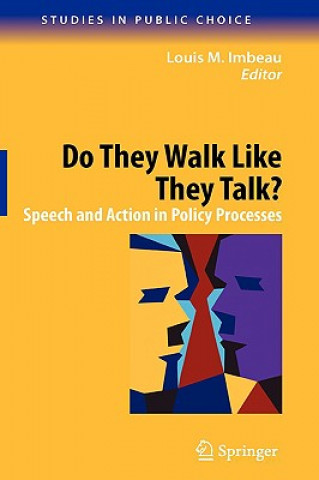
Kód: 01383414
Do They Walk Like They Talk?
Autor Louis M. Imbeau
George Bush s 1988 campaign pledge, "Read my lips: no new taxes," has become a mantra for those who distrust politicians and bureaucrats. The gulf between what political leaders say and do seems to be widening, and in democratic s ... celý popis
- Jazyk:
 Angličtina
Angličtina - Vazba: Pevná
- Počet stran: 306
Nakladatelství: Springer-Verlag New York Inc., 2009
- Více informací o knize

5094 Kč

Skladem u dodavatele v malém množství
Odesíláme za 12-15 dnů
Potřebujete více kusů?Máte-li zájem o více kusů, prověřte, prosím, nejprve dostupnost titulu na naši zákaznické podpoře.
Přidat mezi přání
Mohlo by se vám také líbit
-

Valentia Lifeboats
673 Kč -

Kingdom
378 Kč -

Moon and Sixpence
265 Kč -

Trauma and the Soul
1648 Kč -

Macmillan Readers Prince and the Pauper The Elementary Reader Without CD
261 Kč -

Achieve: Level 2: Skills Book
638 Kč -

Denes Agay's Learning to Play Piano - Scale Book
310 Kč -

Apes and Human Evolution
2936 Kč -

Lacan and Contemporary Film
807 Kč -

Art of Racing in the Rain
440 Kč -

Advances in Clinical Child Psychology
4488 Kč -

Interplanetary Mission Analysis and Design
6578 Kč -

Věda jde k lidu!
644 Kč -

Die Freiheitsrechte, insbesondere die Eigentumsfreiheit, als Kontrollmaßstab für die Einkommensbesteuerung.
1982 Kč
Dárkový poukaz: Radost zaručena
- Darujte poukaz v libovolné hodnotě a my se postaráme o zbytek.
- Poukaz se vztahuje na celou naši nabídku.
- Elektronický poukaz vytisknete z e-mailu a můžete ihned darovat.
- Platnost poukazu je 12 měsíců od data vystavení.
Více informací o knize Do They Walk Like They Talk?
Nákupem získáte 509 bodů
 Anotace knihy
Anotace knihy
George Bush s 1988 campaign pledge, "Read my lips: no new taxes," has become a mantra for those who distrust politicians and bureaucrats. The gulf between what political leaders say and do seems to be widening, and in democratic societies around the world, contributing to an atmosphere of cynicism and apathy among the citizenry. Understanding the characteristics and functions of speech in policy processes is a requirement for trying to overcome this problem; indeed, politicians and bureaucrats spend a good proportion of their time and resources discoursing, i.e., writing, speaking, and publishing. However, there has been scant analysis of political discourse; the aim of this book is to fill this analytical gap, by exploring political speech from a variety of perspectives, including normative, epistemological, and empirical. Incorporating insights from economics, political science, philosophy, and law, and evidence from the United States, Canada, France, Italy, Turkey, and the EU, the book addresses a wide variety of timely issues, including:.§Fiscal discipline in speeches vs budget balance: Is an improvement (deterioration) of the budget balance preceded by a more (less) fiscally disciplined discourse? §Revenues and spending forecasted in budget speeches vs realised budget outcomes: Is there a systematic bias? If so, how can we explain it?§Electoral pledges vs actual realisations: Do governments follow up on their electoral pledges? §Ideological stance in party publications vs spending and revenues of party governments: Do parties of the right and the left speak different languages? How can we validly classify a government as of the left or of the right? Is there a systematic difference between governments of the right and of the left in terms of their policy?§Speeches by central bank officers vs monetary policy: Can changes in monetary policy be predicted by official speeches?§The political business cycle: How can taking into consideration the speech-action relationship strengthen (or threaten) our knowledge about electoral and partisan cycles in public spending?§Other questions explored include: Should policy makers always tell the truth and all the truth? What are the benefits and the costs of transparency? How can we resolve the apparent contradiction between the democratic demand for transparency and the efficiency requirement of secrecy in many policy areas (budget preparation, monetary policy, foreign policy, security, etc.)? Under which conditions is secrecy acceptable in a democratic society? To what extent may deception and lies lead to a breach of trust or to power abuse? What are the most efficient institutional mechanisms to prevent such abuse? Collectively, the authors present new insights for understanding political process and government activity, and suggest avenues for further research.George Bush s 1988 campaign pledge, "Read my lips: no new taxes," has become a mantra for those who distrust politicians and bureaucrats. The gulf between what political leaders say and do seems to be widening, and in democratic societies around the world, contributing to an atmosphere of cynicism and apathy among the citizenry. Understanding the characteristics and functions of speech in policy processes is a requirement for trying to overcome this problem. However, there has been scant analysis of political discourse; the aim of this book is to help fill this analytical gap, by exploring political speech from a variety of perspectives, including normative, epistemological, and empirical. Incorporating insights from economics, political science, philosophy, and law, and evidence from the United States, Canada, France, Italy, Turkey, and the EU, the book addresses a wide variety of timely issues, including:§Fiscal discipline in speeches vs budget balance §Revenues forecasted in budget speeches vs realized budget outcomes §Electoral pledges vs actual realizations §Ideological stance in party publications vs spending and revenues of party governments §The political business cycle§Other questions explored include: Should policy makers always tell the truth and all the truth? What are the benefits and the costs of transparency? How can we resolve the apparent contradiction between the democratic demand for transparency and the efficiency requirement of secrecy in many policy areas? Under which conditions is secrecy acceptable in a democratic society? To what extent may deception and lies lead to a breach of trust or to power abuse? What are the most efficient institutional mechanisms to prevent such abuse? Collectively, the authors present new insights for understanding political process and government activity, and suggest avenues for further research.
 Parametry knihy
Parametry knihy
Zařazení knihy Knihy v angličtině Society & social sciences Politics & government Central government
5094 Kč
- Plný název: Do They Walk Like They Talk?
- Podnázev: Speech and Action in Policy Processes
- Autor: Louis M. Imbeau
- Jazyk:
 Angličtina
Angličtina - Vazba: Pevná
- Počet stran: 306
- EAN: 9780387896717
- ISBN: 0387896716
- ID: 01383414
- Nakladatelství: Springer-Verlag New York Inc.
- Hmotnost: 616 g
- Rozměry: 236 × 163 × 33 mm
- Datum vydání: 01. July 2009
Oblíbené z jiného soudku
-

Laws of Power
803 Kč -
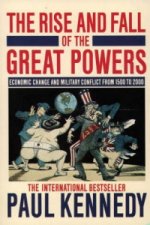
Rise and Fall of the Great Powers
464 Kč -

Last Hours of Ancient Sunlight: Revised and Updated Third Edition
368 Kč -
![What Has the Government Done to Our Money? [Reprint of First Edition] What Has the Government Done to Our Money? [Reprint of First Edition]](https://media.libris.to/jacket/08800577t.jpg)
What Has the Government Done to Our Money? [Reprint of First Edition]
187 Kč -

New Tsar
276 Kč -
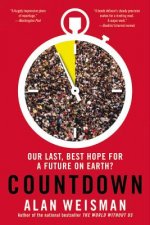
Countdown
849 Kč -

What's Wrong with Protectionism
842 Kč -

Blowback
435 Kč -

Weapons of Math Destruction
334 Kč -
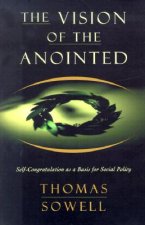
Vision of the Anointed
406 Kč -
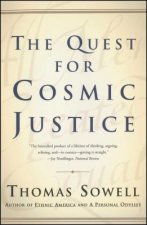
The Quest for Cosmic Justice
347 Kč -

Soul at Work
403 Kč -
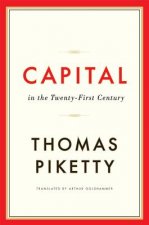
Capital in the Twenty-First Century
1069 Kč -

Wealth, Poverty and Politics
830 Kč -
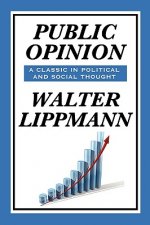
Public Opinion by Walter Lippmann
355 Kč -

Kissinger
422 Kč -
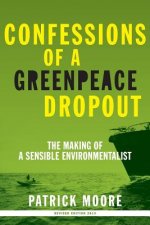
Confessions of a Greenpeace Dropout
1070 Kč -
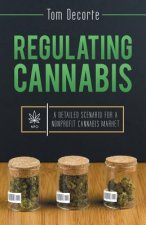
Regulating Cannabis
236 Kč -

Accessory to War
680 Kč -
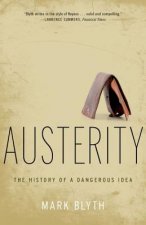
Austerity
357 Kč -
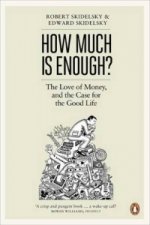
How Much is Enough?
303 Kč -

Five Stages of Collapse
499 Kč -
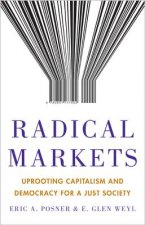
Radical Markets
891 Kč -

Breaking the Vicious Circle
1088 Kč -

Chasing the Scream
368 Kč -

Cortical Visual Impairment - Approach to Assessment
2216 Kč -

Preserving Biodiversity
254 Kč -

In Defense of Degrowth
644 Kč -

Columbine High School Massacre
808 Kč -
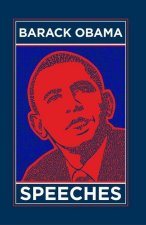
Barack Obama Speeches
491 Kč -

Oxford Handbook of the Welfare State
1055 Kč -

American Age
1699 Kč -

Production of Money
318 Kč -

American Power And The New Mandarins
681 Kč -

Millipedes and Moon Tigers
850 Kč -
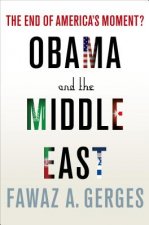
Obama and the Middle East
481 Kč -

Is Democracy Failing?
394 Kč -
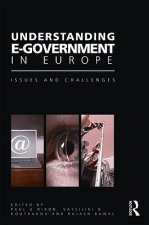
Understanding E-Government in Europe
1900 Kč -

Foreign Policy Begins at Home
571 Kč -

Fairness versus Welfare
1769 Kč -

Monetary Nationalism and International Stability
351 Kč -

Watchdog Still Barks
800 Kč -
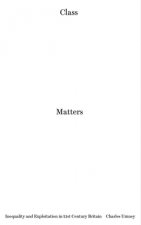
Class Matters
698 Kč -

Environmental Policy
1464 Kč -

Stop! Armed Police!
839 Kč -
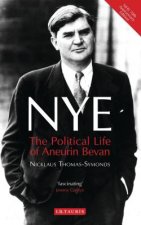
NYE
918 Kč -

Global Warming Scam
567 Kč -
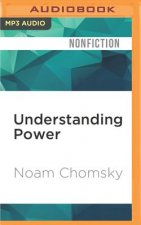
Understanding Power: The Indispensable Chomsky
764 Kč -

Art Of Hybrid War
216 Kč
Osobní odběr Praha, Brno a 12903 dalších
Copyright ©2008-24 nejlevnejsi-knihy.cz Všechna práva vyhrazenaSoukromíCookies


 Vrácení do měsíce
Vrácení do měsíce 571 999 099 (8-15.30h)
571 999 099 (8-15.30h)